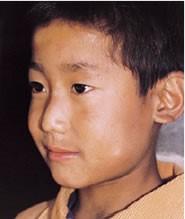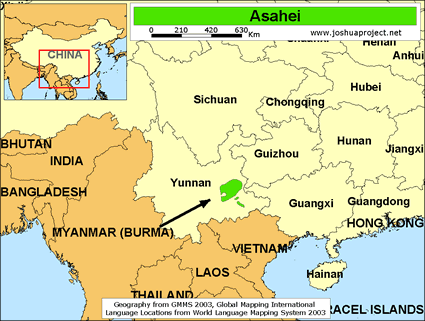The Asahei are not granted status as a minority group in China. They are one of five tribes the Chinese collectively call Aza, although the name is not used by any of the five groups themselves. The Aza, in turn, have been combined with approximately 120 different ethnolinguistic groups to form the large Yi nationality. Many of the groups within the Yi do not acknowledge kinship, and the linguistic diversity among many groups is so great that they are often forced to speak Chinese in order to communicate. One source from the early 1900s even divided the Yi into 485 clans! - "with each clan occupying a distinct territory."
Although today the Asahei and other Yi appear to live in relative peace and harmony with other groups, in the past they were known as an incredibly violent people. One observer remarked how "Clan feuds seem to have been endemic. ... They are caused by arguments over women, insults ... murder, theft (especially of slaves or horses), and defaulting on a debt; but, as elsewhere, the reasons for most feuds were long forgotten, and each clan had traditional enemies. Battles or war could be averted if the offenders paid an indemnity in silver or horses, or, if the offending clan were poor and no loss of life was involved, the wrong-doer might go on horseback (wearing a silk dress with a mirror in his hair and raw beef in his mouth) to apologize and to offer wine and beef to the offended party.
Today many customs and ceremonies among the Asahei are becoming extinct. Until recently they played traditional bamboo musical instruments and carried pouches which contained charms such as boar's teeth, tiger claws, bear claws, and prayers written by the shaman to guide their lives and bring good luck and prosperity.
Ancestor worship is the predominant religion among the Asahei today. Many Asahei under the age of 40 are nonreligious and participate in the rituals of their parents only with reluctance.
There has never been a single known Christian church among the Asahei. French Catholic missionary Paul Vial, who worked among the related Axi and Sani peoples, found that he was accepted because the Yi believed they were also of Caucasian descent.
The Asahei people need to submit to Jesus Christ so they can experience the abundant life he offers them in John 10:10.
Pray for the authority of Christ to bind hindering spiritual forces to lead them from darkness to light.
Pray for signs and wonders to happen among them and for great breakthroughs with a rapid multiplication of disciples and house churches.
Pray for bold workers who are driven by the love of the Holy Spirit to go to them.
Pray for an unstoppable movement to Christ among them.
Scripture Prayers for the Asahei in China.
Operation China, Asia Harvest, Copyrighted © Used with permission
| Profile Source: Joshua Project |











